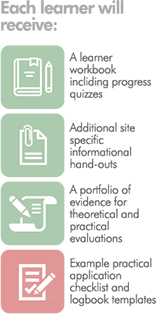 Q
Quality control is not an afterthought but an integral part of construction project success. HRETD's "Apply Quality Principles on a Construction Site" course empowers you with the know-how to maintain and improve quality standards on site. From quality assurance processes to defect identification and rectification, the course curriculum is comprehensive and enriched with multimedia elements like quizzes and videos.
Lay a Strong Foundation with practical exercises within the course focus on real-world applications of quality principles. Whether it's materials testing, workmanship evaluation, or documentation, participants will acquire the skills to monitor and enforce quality guidelines effectively, ensuring that the end product meets or exceeds client expectations.
Build for Excellence. Upon successful completion of the course, participants will be awarded a CETA-accredited certification, verifying their expertise in construction site quality principles. This training is indispensable for professionals striving for excellence in construction projects, thereby upholding both organisational and industry standards.
Construction site safety training

Apply quality principles on a construction site training
Occupational health and safety
Course content
Introduction to Quality Principles in Construction
We cover an overview of quality principles, their importance in the
construction industry, the benefits of implementing quality management systems, and
the roles and responsibilities of various stakeholders in ensuring quality on
construction sites.
Regulatory Requirements and Standards
This module focuses on understanding the relevant regulations, guidelines, and
industry standards governing quality management in construction, as well as employer
and employee responsibilities in compliance.
South African Building Regulations and Legislation
This module covers an outline and introduction to:
National Building Regulations and Building Standards Act
Occupational Health and Safety Act (OHSA)
Construction Industry Development Board (CIDB) Regulations
South African National Standards (SANS)
National Environmental Management Act (NEMA)
Local Municipal By-Laws and Regulations
Quality Management Systems and Tools
We discuss the key components of quality management systems, such
as documentation, quality planning, quality control, quality assurance, and quality
improvement, as well as the use of various quality management tools, including
checklists, process maps, and performance metrics.
Quality Planning and Control
Participants will learn about developing and implementing quality plans, setting quality
objectives, identifying key performance indicators, and establishing effective quality
control processes to monitor and measure performance against established
benchmarks.
Quality Assurance and Auditing
We cover the principles of quality assurance, the role of internal and
external audits, conducting regular inspections and tests, and the importance of
corrective and preventive actions in addressing identified issues and maintaining
continuous improvement.
Communication and Collaboration for Quality Management
This module emphasizes the importance of effective communication and collaboration
among project stakeholders, including clients, contractors, suppliers, and regulatory
authorities, as well as the use of technology to facilitate information sharing and
decision-making.
Risk Management and Quality
Participants will explore the relationship between risk management and quality
management, understanding the role of risk assessment and mitigation in maintaining
quality on construction sites, and the importance of integrating risk management
practices into overall quality management strategies.
Construction Materials and Quality Management
We cover the importance of selecting and sourcing high-quality
materials for construction projects, understanding material specifications and
standards, and the role of material testing and inspection in ensuring quality.
Quality Control and Inspection Techniques
Participants will learn about various inspection techniques and quality control
methods, such as visual inspection, non-destructive testing, and destructive testing, as
well as the proper use and interpretation of test results.
Project Quality Management and Documentation
Focuses on establishing and maintaining comprehensive project quality
documentation, including quality plans, inspection records, and test reports, as well as
using this documentation to track progress, identify trends, and support decisionmaking.
Quality Management for Subcontractors and Suppliers
We discuss the importance of quality management in the selection and
management of subcontractors and suppliers, ensuring that their performance meets
project requirements and contributes to overall project success.
Sustainability and Quality in Construction
Participants will explore the relationship between sustainability and quality in
construction, understanding how sustainable practices can contribute to improved
quality outcomes, and the role of green building standards and certifications.
Lean Construction and Quality Management
Introduces the principles of lean construction and their application in
quality management, focusing on reducing waste, improving efficiency, and enhancing
overall project performance.
Lean Construction and Quality Management
Introduces the principles of lean construction and their application in
quality management, focusing on reducing waste, improving efficiency, and enhancing
overall project performance.
Assessment methods
We conduct a formative theoretical assessment at the beginning of the course to gauge the learner’s initial understanding (novices only). At the end of the training, a summative theoretical and practical application assessment is conducted, to find if the learner is competent; if not, additional developmental areas are identified and suggested.